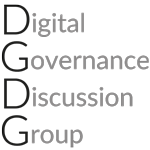-
Navigating the Dynamic Landscape of International Digital Policy: A Multi-Stakeholder Approach
By Dr. Irina Soeffky. “We consider the multi-stakeholder approach essential for global digital networking,” states Germany’s first Strategy for International Digital Policy. Indeed, as digital transformation accelerates, the… Continue reading
-
Digital Synergy: The Urgent Case for WSIS-SDG Alignment
By Pari Esfandiari. The recent Global Digital Compact (GDC) discussions held in September 2024 have reignited the call for a more integrated approach to digital governance, highlighting the… Continue reading
-
Navigating the AI Revolution: Global and Regional Strategies for Responsible Governance.
An overview of the UN, the UAE and Regional Initiatives. By George Salama. Humanity is witnessing a revolutionary race at an unprecedented pace— a race driven by artificial… Continue reading
DGDG
The Digital Governance Discussion Group (DGDG) is an informal multistakeholder platform to contribute to the making of the Global Digital Compact (GDC) in 2024 and the review of the UN World Summit on the Information Society (WSIS+20) in 2025.
We encourage experts from all stakeholder groups to contribute. If you want to publish your article, please contact info@dgdg.blog.
What is Digital Governance?

We, the representatives of the peoples of the world, assembled in Geneva from 10-12 December 2003 for the first phase of the World Summit on the Information Society, declare our common desire and commitment to build a people-centred, inclusive and development-oriented Information Society, where everyone can create, access, utilize and share information and knowledge, enabling individuals, communities and peoples to achieve their full potential in promoting their sustainable development and improving their quality of life, premised on the purposes and principles of the Charter of the United Nations and respecting fully and upholding the Universal Declaration of Human Rights.
Internet governance is the development and application by governments, the private sector and civil society, in their respective roles, of shared principles, norms, rules, decision-making procedures, and programmes that shape the evolution and use of the Internet.

“The issues with the Internet are numerous and complex. Even the definition of what we mean by internet governance is a subject of debate. But the world has a common interest in ensuring the security and the dependability of this new medium. Equally important, we need to develop inclusive and participatory models of governance. The medium must be made accessible and responsive to the needs of all the world’s people. In managing, promoting and protecting the internet’s presence in our lives, we need to be no less creative than those who invented it. Clearly, there is a need for governance, but that does not necessarily mean that it has to be done in the traditional way, for something that is so very different.”
Kofi Annan, UNICTTF New York 2004

“Digital technology is shaping history. But there is also the sense that it is running away with us. Where will it take us? Will our dignity and rights be enhanced or diminished? Will our societies become more equal or less equal? Will we become more, or less, secure and safe? The answers to these questions depend on our ability to work together across disciplines and actors, across nations and political divides. We have a collective responsibility to give direction to these technologies so that we maximize benefits and curtail unintended consequences and malicious use. And so far, we have not kept pace. There is an absence of technical expertise among policy-makers, even in the most developed countries. Invention is outpacing policy-setting. And major differences in culture and mindset are creating further challenges. The private sector has an attitude of trial and error, moving rapidly and correcting retroactively. Meanwhile, policy-makers prefer thorough consultative processes, and are reluctant to define policy frameworks and regulations before there is clarity on all consequences. So, while industry has been forging ahead and at times breaking things, policy-makers have been watching from the side lines.”
Antonio Guterres, IGF Berlin 2019
